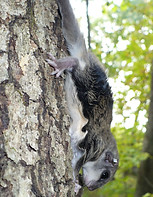
Jacques Wildlife Ecology Lab







General Ecology - Biology 350
A lecture and laboratory course designed to examine the causes of patterns in the abundance and distribution of organisms at the population, community, ecosystem, landscape, biome, and global levels. The relationships of ecological principles to environmental issues and large-scale ecological processes also are examined. The primary goal of this course is to introduce students to the science of ecology. At the completion of this course, students should have a basic understanding of the factors affecting the abundance and distribution of organisms, the interrelationships of organisms with each other and their environments, and the importance of ecological principles to environmental issues.


Introduction to Animal Biology - Zoology 200
A lecture and laboratory course emphasizing basic principles in animal biology including scientific inquiry, cell biology, genetics, ecology, evolution, and diversity in plant/animal anatomy and physiology. The primary objective of this course is to provide students with a framework of knowledge and an understanding of biological science that they can build on in more advanced courses. Students are expected to learn basic scientific principles through a detailed examination of selected examples discussed in the textbook or presented as lecture materials during scheduled class meetings. Biological principles covered during class lectures are reinforced using a variety of laboratory exercises throughout the semester.

Mammalogy - Zoology 412
An upper-level undergraduate/graduate course examining the classification, distribution, life histories, economic importance, techniques of field study, method of collection, and preservation of mammals. The purpose of this course is to acquaint students with the identification, systematics, life history, and adaptive strategies of Mammalia and to expose them to field techniques used in their study. This includes understanding a variety of topics, including the characterization of mammalogy and mammalian traits; evolutionary history of the various mammalian lineages; physiological adaptations of mammals for homeostasis and reproduction; characterization of the orders and families of the extant mammals; and morphological and behavioral adaptations of mammals for feeding, locomotion, and reproduction. Concepts are reinforced in the laboratory, where students learn to recognize mammal characteristics and many species of native Illinois mammals.
Courses

Wildlife Management - Zoology 562
A graduate course focusing on the application of ecological principles of the management and conservation of wildlife resources using a problem-based format. We cover the history and development of wildlife management as a science; characteristics of, and factors affecting wildlife populations; techniques and theories of management; and wildlife conservation. This course uses a wide array of scientific literature within a discussion format to expose students to theoretical principles of the ecology and management of wildlife resources. Additionally, we delve into different techniques, perspectives, and approaches to both identify and achieve wildlife management goals and objectives.


